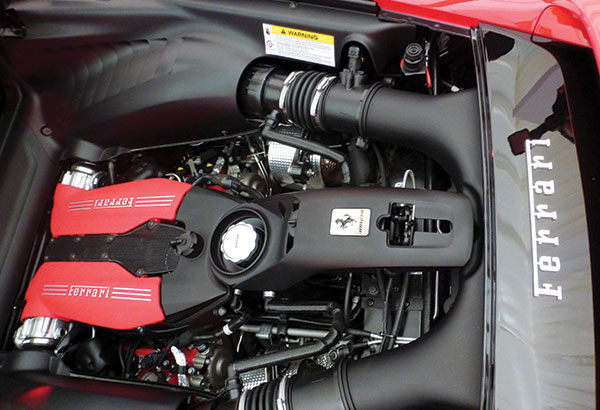Autostrada chairman and president Wellington Soong with Ferrari Far East Hub managing director Dieter Knechtel
A deep roar reverberated through Autostrada Motore’s showrooms last week with the official launch of the celebrated Ferrari 458 Italia’s worthy successor – the 488 GTB. Its twin-turbocharged 3.9-liter V8 heart had emitted the sonorous growling, underlining the physicality and sheer power of the new Maranello son. Front and center, the sexy vehicle painted in classic rosso corsa emerged – dramatically peering out through a fog at the gathered motoring journalists ogling it.
“The year is coming to an end, and what a way to end (it),” Wellington Soong, chairman and president of the Autostrada Motore, had declared. He and son Jason (executive director of the noted dealership of some of the world’s exclusive, premium auto brands), expressed excitement at the entry of the 488 GTB.
Indeed, there is a lot riding on this particular prancing horse. In an exclusive interview with STAR Motoring, Dieter Knechtel, managing director of Ferrari’s Far East Hub, explained that the 488 GTB is in “the segment where Ferrari has the biggest available customer base.” These clients, he continued, are also the most traditional as far as expectations go. Equipped with a mid-mounted V8 that promises a stable of 670 horses (up 100hp over the 458) and 760 Nm (plus 40 percent over the same car) on tap, the 488 GTB “enhances all the purist Ferrari values, and driving pleasures we can combine in one car for everybody who is interested in buying a sports car.”
Ferrari considers our country an important market. Knechtel averred: “The Philippines has always been an interesting place for us. In the past, of course, some reasons related mainly to infrastructure have not been enabling us to develop as fast as we could in other markets… But now this has been changing.
“The infrastructure problem is still here, but what I believe we must do now as people responsible for Ferrari, is to provide opportunities to drive in specific forms, in specific places, using platforms across Asia or in the Philippines in order to give more opportunities to drive the car and make use of the car and that would be in line with the expectations of many young customers that we have.”
The Ferrari executive in charge of Southeast Asian territories plus Japan, South Korea, Australia, and New Zealand observed that “a lot of good things have been happening recently,” and asserted: “The country’s in a boom. It’s in a very strong development in every segment on every level… with this boom (comes) the improvement of the personal situation of some of our future customers.”
Business ( Article MRec ), pagematch: 1, sectionmatch: 1
Compared to Ferrari’s 2+2 hardtop convertible, California T, the 488 GTB generally appeals to the established fan of the Italian supercar maker.
The California T, maintained Knechtel, “is a model launched particularly to capture opportunities in new market segments with new customers who have not driven a Ferrari before.” The data gives credence to this observation, with “more than 70 percent” of California T buyers being first-time Ferrari buyers. “Once you drive a Ferrari, you develop a desire to have more,” underscored the executive.
It’s hard to fathom why one would not covet the 488 GTB – except for the pretty obvious concern of financial capability.
For as beautifully designed and engineered as it was the 458 Italia is outdone by the 488 GTB in across a variety of qualities – including drag coefficient (53 percent better) and downforce generation (50 percent more) through active and passive aerodynamic tech. It is at once graceful and muscular; a beauty and a beast that Ferrari says can top 100 kph in three ticks, and attain 200 kph in 8.3.
Business observers and analysts across a number of industries – automotive included – predict with certainty that massive business growth can be realized most vigorously in the Asia Pacific region. Knechtel agrees with the view, but is quick to qualify how it impinges the Ferrari business model.
“As a general note, Ferrari is not seeking volume growth in the first place. It is not the ultimate goal,” he said, noting that it is all about “balance.” A sales spike somewhere will inevitably be offset by a reduction in another territory. Ferrari has never put forward more volume for volume’s sake – as in the 488 GTB’s case. “We have had huge positive reaction to the car… but it doesn’t mean that we just increase production,” Knechtel insisted.
Ferrari eschews the typical business approach of front-loading supply of a product until it demand gradually plateaus. “Our ‘curve’ is always flat, because we steer our volume in a way that there is consistency over years. Not a peak one year then it flattens out the next,” he explained. It’s all about “managing customers, lifecycles, and waiting time, to allow for stability.” Even in difficult times, Knechtel stressed, Ferrari is “consistent and stable… the Ferrari business model is different.”
An offshoot of this uncommon business execution is the preservation of Ferrari’s legendary exclusivity which, Knechtel asserted, is “one of the pillars of our success over time. That will not change.”
He underscored: “We want to grow, but in a very natural way. It’s not always about volume growth, but about improving the quality of the business that we do – how we take care of our customers, how we work with the ownership experience. What can we offer in addition to what the customer expects?” It’s a lot about loyalty, too. “Loyalty is higher for Ferrari than our main competitors,” posited Dieter Knechtel.
So for the loyal subjects in Ferrari’s rarefied kingdom, long live the 488 Gran Turismo Berlinetta. Thou may start drooling again.
![]()